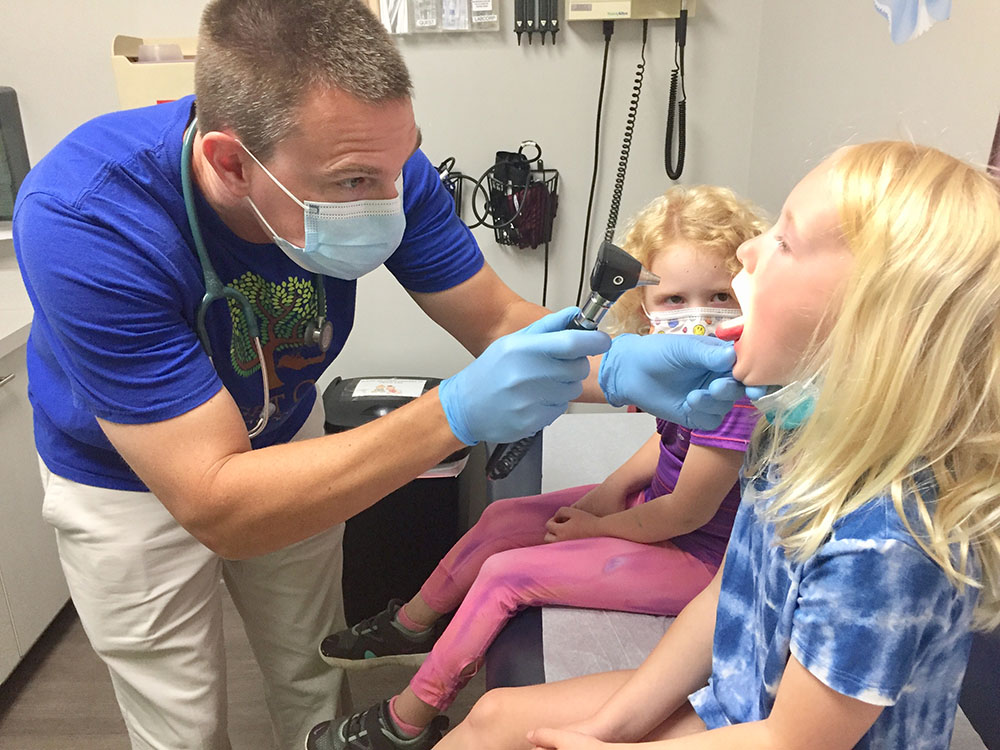
examines Gloria Farmer while her sister Camille looks on. | By Laura Farmer
For some kids, visiting their pediatrician is all about the lollipops.
“There have been times when my kids were nervous about getting a shot, but now they associate going to the doctor’s with getting a lollipop! They’re like, ‘I get a shot, then I get a lollipop—worth it!’” says Gabriela Clonan, B.S.N., R.N., C.B.C., a mother of three and nurse from Abingdon, Maryland.
Of course, Clonan knows that lollipops aren’t the only reasons to stay up-to-date with her kids’ wellness visits.
“There have been times I had concerns, especially when my kids were newborns, and I shared them with the pediatrician at their checkup. It always helped,” Clonan says.
Checkup Checklist
According to Dr. David Sulkowski, D.O., a pediatrician with Bright Oaks Pediatric Center in Bel Air, Maryland, your child’s annual checkup is important for many reasons.
Vital Signs and Growth
“There are different things we check for each age. But we always check a child’s vitals and weight, height, and head circumference for babies. Then everything gets plotted on the patient’s growth chart. We can get a lot of information about (kids’) general health, such their nutrition or if they have an illness, by tracking their growth,” explains Sulkowski.
Physical Exam
Another important part of the wellness visit is a head-to-toe examination of the child’s body, including their private parts, which can be uncomfortable for some children.
“I recommend that parents prepare kids for this part of the exam beforehand,” says Dr. Jennifer Burns, M.D., pediatrician and owner of Urbana Pediatrics in Urbana, Maryland. “We need to have a visual inspection of their whole body to ensure that everything is developing as it should and there are no concerns.”
Dr. Burns also offers another pro tip for kids who may be especially uncomfortable: wear a bathing suit.
Developmental Milestones
Your child’s pediatrician will also assess if your child is meeting developmental milestones, such as learning to talk in the younger years, or doing well in school for older kids.
“We have a very strict list (from the American Academy of Pediatrics) of developmental milestones that we look at for each age. We also spend a lot of time checking on social development and academic performance,” Sulkowski says.
Mental Wellness
Checking on a patient’s mental health is also important, especially in the adolescent years.
“We do a lot of screening and evaluation for mental health concerns for our older patients,” says Sulkowski. “It has always been a big issue, but it seems to have blossomed even more with COVID-19 and isolation and the stress of getting back to normal.”
Delaware Valley Pediatric Associates in Lawrence, New Jersey, offers patients counseling through the COPE program, a cognitive behavioral therapy program focused on reducing negative or unhelpful thoughts and increasing healthy behaviors.
Education
Pediatricians also make it a point to hear parents’ concerns and provide resources and education to support them. They also offer anticipatory guidance, which includes a rundown of milestones the child should be meeting in the next few months. Doctors also offer general health education, such as the importance of sleep, exercise, good nutrition and limited screen time.
Vaccines
For many kids, perhaps the most infamous part of the wellness visit is “getting a shot.”
“I really don’t like needles!” says Macie*, a vivacious sixth grader from Abingdon. “I remember when I was 6 years old, and I literally ran out of the room into the lobby. My mom had to come and pin me down so that they could give me a shot. Now I’m a little more reasonable, but I still don’t like getting shots!”
According to Dr. Sulkowski, parents can use a few tricks to help kids like Macie relax before their vaccine.
“There are some kids we can talk through it,” he says. “Bribing with toys, lollipops or stickers can also be helpful. It’s extremely important for children to not miss their scheduled vaccines. This is probably the most important way to keep children safe from a lot of different diseases.”
Preparing for Your Child’s Checkup
Your child’s pediatrician needs to cover a lot of ground during the wellness visit. You can make the most of your time together by preparing ahead of time.
Experts say the following five activities will help you make the most of your visit:
1. Arrive early.
Parents often need to attend to insurance forms, wellness assessments and other administrative tasks before the visit.
2. Write down your questions in advance.
“If you have specific questions or concerns, make a list to bring to your visit,” advises Burns. “If you have a lot of concerns or ‘big concerns,’ such as depression, autism, or ADHD, you may want to speak with your pediatrician’s office staff prior to the visit so that adequate time is available for the visit.”
3. Practice!
Younger kids especially love imaginative role play games. Playing doctor is the perfect way to introduce them to what will happen during their well visit.
4. Talk about it.
Talk to your kids about what to expect and why each part of the visit is important. Books or cartoons about doctor’s visits could be a helpful tool to help them understand.
5. Bring a book, toy or screen.
Dr. Susan Henrikson, M.D., a pediatrician with Northern Virginia Pediatric Associates, advises, “I find some of the kids who are having a hard time, if they have a book or toy or something to distract them from just sitting there, it usually goes better.”
She adds that bringing a phone to entertain your child can sometimes be helpful, but not always. “I think there are certain cases where showing a video on your phone is OK, such as for an older child who is waiting for a sibling or who is bored,” explains Henrikson, “but it is not my favorite for younger children. Parents get distracted trying to find the right video, instead of attending to their child.”
Well On Your Way
Finally, regular wellness visits with your child’s pediatrician offer the opportunity to build a relationship with a knowledgeable expert who cares about your child.
Henrikson says she gets a lot of joy from seeing her patients develop and grow.
“It can be the little 6-month-(old) baby who’s just smiling and drooling all over the place. I love seeing the pride in a parent who wants to show how well their toddler is walking. I love being able to talk to a teenager and know that they feel comfortable to admit stuff to me that they haven’t told anyone before,” she says. “It can be a really special relationship.
*Last name has been withheld per parent’s request





